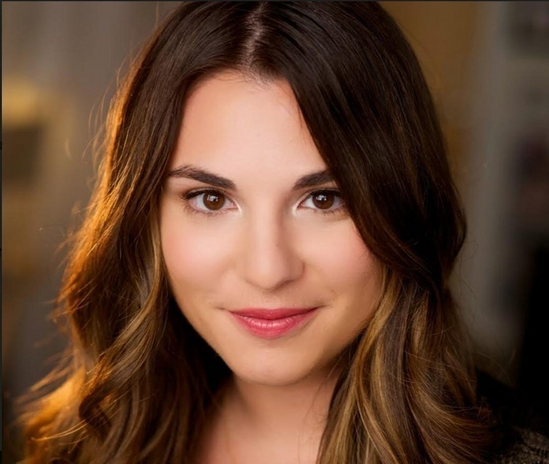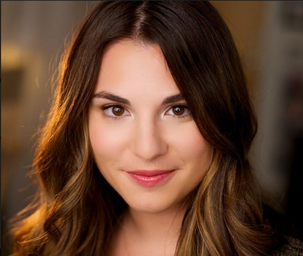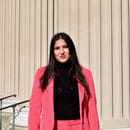Victoria Aveyard is known to most because of her New York Times number one bestselling Red Queen series. But for some, the California-based Aveyard is recognized from her vocal Twitter presence where she discusses everything from politics, what she’s reading, to the pasta she is eating for dinner. However, in the past few years, her feed has focused more on the former.
It is not just Aveyard’s social media presence that focuses on politics, but her novels as well. Even so, Aveyard had never set out to write political novels. The history buff was fascinated by dictators: their rise and fall, the cyclical nature of that process. As a result, her works began to be flavored by political overtones, then more direct references to authoritarian systems.
Her first novel, Red Queen, came out in 2015. Aveyard manifested a deep lore and society where the color of one’s blood determines their status. Her protagonist, Mare Barrow, is a Red — the lesser race in Norta. However, after a near-death experience, she discovers she has powers of her own. Red Queen touches upon issues of race, class, and gender in an autocratic system that feels current in today’s political climate.
She was criticized for her third novel, King’s Cage, for it being too closely tied to the 2016 presidential election and based on the political. Even so, the book was actually written far before the election mania had taken over, as it was published in February 2017. “I like to think that anyone offended because they read Donald Trump in my villains or my oppressive government is telling me more about themselves. My inspirations come mostly from history, but unfortunately, dictators follow the same pattern,” Aveyard says. She added that the series was not influenced by Donald Trump. “It was influenced by historical tyranny, which is, unfortunately, being mirrored in our modern reality. But I absolutely hit harder on certain points or wrote with a deeper anger because of the political climate.”
She believes that art will always be influenced by the world around us.
Aveyard hit her stride when she published Red Queen, her first novel. Her characters were flawed. The young adult fantasy novel captured the attention of millions and was the first book by a first-time author to reach number one on the New York Times Best Sellers List. Red Queen resonated with people across the world because it presented a world like our own that was outside the scope of everyday life. Norta was fictional, but people from all walks of life could empathize with Mare and her struggles.
In writing Red Queen, Aveyard wanted to create a fantasy novel, but have it reflect history. “I love stories that take the scope of history into account, and try to emulate that in my own work,” she says. The history that interested her the most was that of dictatorships and empires. Those political elements became an integral portion of Red Queen, and will influence her work to come. “I think political plots or backdrops will always flavor my work in some way.”
While some might condemn politically-based novels, Aveyard claims that authors are virtually unable to write without the political embedded into it. “I don’t understand anyone who says fiction, particularly fantasy, shouldn’t be colored by modern politics or the author’s reality. That’s nearly impossible. Art reflects the world it was made in. I find the reverse even more confusing — not including any sort of response to current society is a choice in itself, a bizarre and untruthful one in my opinion, that undercuts your work and makes it less accessible to most audiences,” she says. She added that the purpose of literature is for an author to reflect their reality. “Politics affects all our realities, or at least it does for most people. Very, very few people have the luxury to ignore politics.”
She always knew she wanted to write, just not young adult literature.
Since she was a small child, Aveyard has loved movies. Once she was able to read, she also began a lifelong love of reading and books. It was the storytelling aspect that drew her to both of those mediums. When she moved from home to California to attend college, she studies screenwriting with the hope to tell her own stories. “Writing and creating stories has been my passion since I was young enough to understand what story was,” she says.
She found herself heavily influenced by the Lord of the Rings series, Harry Potter, and Star Wars. However, she mentioned that there were many other pieces of literature, film, and television that influenced her story, including A Song of Ice and Fire and surprisingly, Pokémon.
Aveyard started many eventually abandoned novels and scripts; Red Queen was the first manuscript she actually finished, and it ended up being her first published novel. For her, writing was not a process that required finishing a piece of work. Instead, she had to wait for the right idea to come to her. “I didn’t so much decide I was going to write a book so much as keep my brain open for inspiration, and when it struck, I knew this particular idea would be best suited as a novel and then, upon further brainstorming, a YA series,” Aveyard says.
This idea was “a girl in an arena about to be executed, but then she electrocutes her executioner.” After a long writing process, this idea became Red Queen, which was followed up by three more books for the series and a novella collection. During the ideation stage, she decided that this premise fit best as a young adult series. According to Aveyard, she was enticed by the freedom of the genre. “It’s so fast, so immediate, so visceral — and you can really push the limits in terms of genre. YA is very much the Wild West.”
And Red Queen itself plays with tropes across many genres. It’s a fantasy novel based on real-world political struggles, sprinkled with a love triangle, very dystopian depictions of war, and coming of age.
She tries to make her writing inclusive, but realizes there’s much work to come.
When authors do not provide readers with different forms of representation, Aveyard believes readers “lose both a mirror and a doorway.” To her, literature should be representative of the world around us and “…a story with characters who are all one thing, who look one way, who love one way, who think one way is not a real world or society. It’s jarring and untruthful.”
Pretending that divisions across gender, race, religion, or any other group do not exist is not representative of the real world. “It’s human nature to divide ourselves along lines real or imagined, just as it’s human nature to seek affection or belonging. I don’t know how to write a society without either.” With fantasy, Aveyard and other authors are able to “dress up” sociological divisions that may be “too heavy” for readers to digest otherwise. According to Aveyard, “I think we all have the potential for evolution in us and sometimes it takes a fictional character to help us push through.” In Harry Potter, its Purebloods versus Mudbloods; the different districts in The Hunger Games; in Red Queen, it is blood color that determines one’s status: either higher-class Silvers or lower-class Reds.
Especially as a fantasy writer, Aveyard believes that sinking the reader in and letting them connect to the characters is integral, and providing a diverse group of characters is one way to make the reader feel closer to a story that does not take place in their world. For many readers, consuming a world with problems that may seemingly not be your own is hard, but Aveyard believes that creating a world that is representative of the one we live in can help readers. “I do what I can to reflect the world I live in and create a reality that feels familiar to an audience, especially to facilitate an easier digestion of complex fantasy. I definitely have work to do on the diversity front and I’m expected to push what I can in my own stories,” she says.
And what she pushes has empowered hundreds of thousands of readers across the world. In her books, she gives power to those who have historically been powerless, gives a narrative to those traditionally deemed unworthy of having a voice. Aveyard recounted how many who are not able-bodied, cisgender, straight, white men feel “out of control in today’s world.” With decisions being made for members of these communities by those who are not members of those communities, it’s hard for many to feel like they have a say in what goes on in their lives. These feelings compelled Aveyard to begin writing empowered female characters who are able to take their power back. “That lack of control manifests in a lot of places, and for me, it manifests in writing young women who are fighting back, who are in control, who are everything they want to be, for good or ill,” she said.
“I’m a straight, white woman, and I know how bad it felt to look for myself in my favorite things and never see my reflection in certain properties. That pain is multiplied tenfold for marginalized readers and audiences, who are represented so much less than I am. Like including politics, I think writing a story without diversity is a choice, conscious or not, and a bad choice for both the work and your readers,” Aveyard added.
Speaking out was always part of her personality.
For many, the action of speaking up requires much forethought. However, for Aveyard using her platform to speak out was not a conscious decision, but instead just her natural reaction to the events happening around her. She had never really labeled herself as a Democrat or even a liberal because most liberal ideas — such as gay marriage and a woman’s right to choose — seemed obvious to her rather than something people should sign on to for a political party.
Aveyard explained that she has always been outspoken. “I don’t have the ability to muzzle myself, it’s not in me,” she says. She also added that as someone with privilege it is her responsibility to actively speak out and use her privilege to help others. “I’m in a safer position than most, because of my skin color, my orientation, my mental health… and I think people like me have a responsibility to speak where others cannot.”
In the recent political era, Aveyard’s knowledge of the past gave reason to why she must speak up because she saw history repeating itself. “The things being said by certain candidates and then certain people in office were just so beyond comprehension. But also so eerily familiar to anyone with even a base knowledge of history. It started with pointing out idiocy, lies, or complete denial of hard facts, which unfortunately attracted a very hostile element on social media.”
Aveyard still wonders how the political climate got so volatile and how politics has become such a cult of personality. “I simply cannot wrap my head around people looking up to see the sky is blue, but then believing it is red because someone who bought themselves the Oval Office said so… I fundamentally don’t understand voting for someone who makes you feel smart versus voting for someone who is smart.”
“And I am so, so viscerally angry that we live in a society where so many people are poorly educated, misinformed, and manipulated to vote against themselves, to the point where any information from outside their tent is dismissed. Right now, with the blooming fury of COVID-19, it’s infuriating to see who is taking this seriously and who isn’t, and where their political leanings lie,” she added.
And she wants her readers to also feel comfortable taking a stand.
Aveyard’s writing is about young women taking control in situations where they are told they should be powerless. Through reading her novels, she wants her readership to do the same. Her advice for her readers is “That they contain strength they cannot fathom. Their potential is endless. And especially for young women, you do not have to be quiet and small and nice to be worthy. Make mistakes, be messy, get angry, get knocked down, and get back up again. Perfect doesn’t exist and shouldn’t exist.”
In writing Red Queen, she struggled with creating a world with its own distinct history and politics while continuing the story. However, despite her initial trouble with this balance of storytelling, she claimed that, “eventually, the story makes its own path, no matter what you’ve laid out before.” The process of writing is one where the author must “be messy, get angry, get knocked down, and get back up again.” So it is extremely important for aspiring authors to not burden themselves with thoughts about their limits and pleasing an audience. Aveyard advises that those who are interested in writing should always think of their story rather than what others would think. “Don’t push yourself into a box you don’t want to be in because you think that’s what an audience wants,” she says.
Looking forward, Aveyard has the first installment of her new young adult fantasy series titled Realm Breaker coming out in May 2021. While she says there will still be political elements in her upcoming novel, they are more medieval than those of Red Queen, focusing on a quest. That will be different from her previous works she is “still definitely utilizing [her] love for flawed characters, especially flawed female characters.”
Much of her worldview comes from moving away from her small Massachusetts hometown to Los Angeles and returning back to her hometown for a year after college. She had experienced a more diverse world and that shaped her outlook. Whether she is writing her next bestseller or tweeting her response to what is happening in Washington, Aveyard takes a strong stand towards what she believes in. However, one thing she hopes is that we can return to a period of normalcy. “I very much hope we can right the ship, but that phrase is incorrect. The ship was never “right” to begin with, but I have to believe we can balance things a bit better in the future, and retake the steps we’ve lost in the last four years. Personally, I’d love the planet to still have polar ice caps when I’m 60.”


